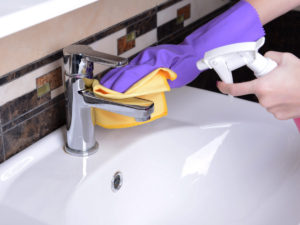 Ever walked into your bathroom, only to be greeted by a smell that makes you think you’ve stepped into a sewer? If so, you’re not alone.
Ever walked into your bathroom, only to be greeted by a smell that makes you think you’ve stepped into a sewer? If so, you’re not alone.
Foul smells emanating from your bathroom drains is not just unpleasant; it’s a sign that something’s not quite right under the surface. You might try every cleaner under the sun, only to find that the sewage smell returns like an unwelcome guest.
The truth is, quick fixes won’t do the trick if you don’t address the root cause. Identifying what’s behind that smell is important—not just for your nose, but for the overall health of your home.
This article dives deep into why your bathroom sink might smell like sewage and offers practical solutions to help you tackle the problem once and for all.
Key Takeaways
- Common causes: Bacteria buildup, sewer line issues, a dry P-trap, and ventilation problems are often to blame.
- Preventive measures: Regular cleaning, proper ventilation, and keeping the P-trap filled with water are key to stopping odors.
- Professional help: Sometimes, calling in the pros is the best way to fix persistent issues.
Common Causes of Bad Smells From Your Bathroom Sink
There’s nothing worse than a sewer smell creeping out of your drain system. But before you start blaming yourself for what you might’ve washed down the drain, let’s take a look at some common culprits.
Bacterial Growth in the Sink
Your bathroom sink sees a lot of action—everything from toothpaste to shaving cream ends up swirling down the drain. Over time, these substances don’t just disappear. Instead, they cling to the sides of your pipes, creating a perfect breeding ground for bacteria.
This bacterial party eventually forms a layer of biofilm, often seen as that slimy black gunk when you peek under your sink stopper. And as if the sight isn’t bad enough, it’s the source of that terrible smell.
To check for biofilm, remove the stopper and take a good look underneath. If you see a slimy layer, you’ve found the problem.
Sewer Line Problems
Sometimes, that nasty smell is more than just a local issue with your sink. It could be a sign that there’s something wrong with your sewer line.
Sewer gas is supposed to stay hidden away in your pipes, thanks to a system of vents and traps designed to keep it out of your home. But when these systems fail—due to a blockage, break, or even just a dry P-trap—sewer gas can rise up through your drain, bringing that unmistakable stench with it. This isn’t something you want to ignore, as sewer gas isn’t just smelly; it can be hazardous to your health.
Dried-Out P-Trap
Speaking of P-traps, let’s talk about how they work. The P-trap is that U-shaped pipe under your sink, and its job is to hold a small amount of water, which acts as a barrier to keep sewer gases from sneaking into your home.
But what happens when that water dries out? Whether it’s due to infrequent use of a guest bathroom or just an unusually hot and dry environment, a dry P-trap means there’s nothing stopping those gases from wafting into your bathroom. It’s a simple problem with a simple fix, but one that can cause a big stink if left unattended.
Ventilation Issues
Your plumbing system is designed with vents that allow sewer gases to escape harmlessly into the atmosphere. But when these vents get clogged—by leaves, debris, or even the occasional curious critter—the gases have nowhere to go but back down your drain.
The result? A bathroom that smells like a backed-up sewer. If you’ve checked your P-trap and cleaned your sink but still have a smell, a ventilation problem could be the reason. It’s a job best left to the pros, but understanding the role of your vents can help you diagnose the issue faster.
How to Prevent Your Bathroom Sink From Smelling Like Sewage
 Now that you know the usual suspects, let’s talk about what you can do to keep that bathroom sink smelling fresh.
Now that you know the usual suspects, let’s talk about what you can do to keep that bathroom sink smelling fresh.
Clean Your Sink to Remove Biofilm Buildup
Start by giving your sink a thorough cleaning. For mild biofilm buildup, a store-bought drain cleaner or a mix of vinegar and baking soda can work wonders. Pour the mixture down the drain, let it sit for about 30 minutes, then flush it with hot water.
If the buildup is more severe, you might need to disassemble the pipes under your sink to clean them out thoroughly. Don’t worry—it’s not as complicated as it sounds. Just make sure you have a bucket handy to catch any water left in the pipes.
Add Water to Your P-Trap
If you suspect a dry P-trap is the cause of the smell, the solution is simple: run the water. Letting water flow through the drain for a few minutes should refill the P-trap and restore its protective barrier.
If the smell doesn’t go away, you might have a bigger issue on your hands, like a cracked P-trap or a sewer line problem. In that case, it’s time to call in a plumber.
Fix Your Ventilation
Got a stinky bathroom and no obvious source? Your plumbing vents might be to blame. Blocked vents can cause sewer gases to back up into your bathroom, leaving you with that unmistakable smell.
Fixing vent issues usually requires getting up on the roof to clear any blockages, so unless you’re comfortable with heights and have the right tools, it’s a job best left to the professionals. But addressing the issue will go a long way in keeping your bathroom odor-free.
Check the Overflow Pipe
The overflow pipe—designed to prevent your sink from spilling over—can also become a source of odors if it collects soap scum, toothpaste, and other gunk.
Cleaning it out is straightforward: pour a mixture of vinegar or bleach down the overflow hole, and use a small brush to scrub away any buildup. Rinse with hot water, and you should notice an immediate improvement.
Address Buildup in Your Pipes
Over time, hair, grease, and other debris can accumulate in your pipes, leading to blockages and unpleasant smells. A quick DIY fix involves pouring baking soda down the drain, followed by vinegar. The mixture will fizz up and help dislodge any stubborn gunk. Let it sit for about 30 minutes, then flush with hot water to clear the pipes and neutralize odors.
Clean the Basin of the Sink
Sometimes, the smell isn’t just coming from the drain but from the sink basin itself. Soap scum, toothpaste residue, and general grime can all contribute to foul odors. Cleaning the basin thoroughly with hot water and soap, followed by a wipe-down with a disinfectant, can help keep things fresh.
How to Keep Your Bathroom Smelling Fresh
Even after you’ve tackled the smell, keeping your bathroom fresh requires a little ongoing effort.
Keep Your Bathroom Clean
Regular cleaning is your best defense against bathroom odors. At least once a week, scrub the sink, clean the toilet, and wipe down all surfaces with a disinfectant. Pay special attention to areas where grime and moisture can accumulate, like the base of the toilet and the edges of the sink.
Use Scented Trash Bags
Trash can be a sneaky source of odors, especially in small bathrooms. Using scented trash bags can help mask any unpleasant smells and keep your bathroom smelling pleasant between deep cleans.
Let Towels and Bath Mats Dry Properly
Wet towels and bath mats are a breeding ground for mold and mildew, which can contribute to bad smells. Make sure to hang towels to dry properly after each use, and wash bath mats regularly to keep them fresh.
Burn Candles or Use Wall Plug-Ins
Adding a pleasant scent to your bathroom can make all the difference. Whether you prefer the warm glow of a candle or the convenience of a plug-in air freshener, a little fragrance can go a long way in keeping your bathroom inviting.
Need Drain Clearing Services in Niceville, FL?
 A smelly bathroom sink can be a sign that something’s wrong. If you’ve tried the tips above and the odor persists, it’s time to bring in the experts.
A smelly bathroom sink can be a sign that something’s wrong. If you’ve tried the tips above and the odor persists, it’s time to bring in the experts.
Benjamin Franklin Plumbing in Niceville, FL, has a team of punctual plumbers ready to diagnose and fix any drain issues you’re facing. They specialize in drain clearing services, ensuring that your plumbing system is in tip-top shape and that your bathroom stays fresh and odor-free.
Final Thoughts
Keeping your bathroom smelling fresh isn’t just about quick fixes; it’s about regular maintenance and knowing when to call for help. While you can handle many of the issues yourself, some problems require a professional touch. Don’t hesitate to reach out to Benjamin Franklin Plumbing in Niceville, FL, if your drain smells won’t go away. They’re just a phone call away, ready to help you reclaim your bathroom from those stubborn odors.
FAQs
Why does my bathroom sink drain smell like sewage?
This could be due to a buildup of bacteria, a dry P-trap, or a problem with your sewer line or ventilation system. Identifying the cause is the first step in resolving the issue.
How do I clean a smelly sink drain?
Try pouring a mixture of baking soda and vinegar down the drain, letting it sit for 30 minutes, and then flushing with hot water. For tougher buildup, you may need to disassemble the pipes and clean them manually.
What is a P-trap, and how does it prevent odors?
A P-trap is a U-shaped pipe under your sink that holds water, creating a barrier that prevents sewer gases from entering your home. If the P-trap dries out, it can no longer block these gases, leading to unpleasant smells.
Can I fix a smelly bathroom sink drain myself, or do I need a plumber?
You can often fix minor issues like biofilm buildup or a dry P-trap yourself with basic tools and supplies. However, if the smell persists, it might be time to call in a plumber, as the problem could be more serious.
How can I prevent my bathroom sink from smelling in the future?
Regular cleaning, keeping your P-trap filled with water, and ensuring proper ventilation are key to preventing odors. Additionally, using scented trash bags and keeping towels and bath mats dry can help maintain a fresh-smelling bathroom.